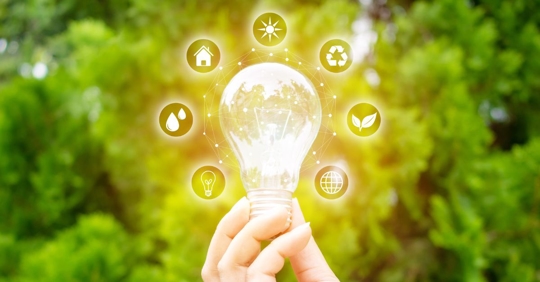Cost Savings and Economic Impact
Energy efficiency isn't just a buzzword—it's a financial strategy that can dramatically reduce monthly utility bills for homeowners and businesses alike. By updating to energy-efficient electrical systems, homeowners can enjoy significant cost savings. These systems minimize energy wastage and optimize electricity usage, leading to a leaner consumption profile and a lower expense on bills. The initial investment required for energy-efficient upgrades may be offset by the return on investment, as these systems often pay for themselves through savings over time. Furthermore, businesses find economic incentives in branding themselves as environmentally conscious entities, which bolsters their market positioning and customer loyalty.
Environmental Impact and Sustainability
Implementing energy-efficient electrical systems serves more than personal financial gain; it aligns with global sustainability goals by reducing carbon emissions and shrinking ecological footprints. Efficient systems consume less power, contributing to diminished demand on fossil fuels, which directly impacts greenhouse gas emissions.
Energy efficiency also translates into less strain on power plants, leading to cleaner air and a healthier ecosystem. By advocating for these technologies, home and business owners participate in a pivotal movement toward a sustainable future, fulfilling not just economic motivations but moral and communal responsibilities.
Smart Grid Technologies
Smart grid technologies represent the cutting edge of energy distribution and consumption optimization, offering real-time monitoring and precise control capabilities. By utilizing advanced metering infrastructure (AMI) and integrating renewable energy sources, smart grids transform conventional energy networks into responsive, efficient systems. These technologies allow grids automatically adapt to consumption patterns, minimizing energy waste and reducing costs. The smart integration of resources like solar and wind into the grid enhances system flexibility, endowing users with more control over their energy use while enabling seamless transition to greener energy solutions.
Energy-Saving Devices and Appliances
Households and businesses can significantly cut their electricity usage with energy-saving devices and appliances designed to function optimally without compromising performance. Innovations such as LED lighting, smart thermostats, and energy-efficient HVAC systems stand out for their ability to drastically slash power consumption. These technologies not only benefit the environment but provide practical, everyday advantages, like extending appliance lifespan and generating long-term savings.
Barriers to Adoption
Transitioning to energy-efficient systems is not without its challenges, and several barriers may hinder widespread adoption. High initial investment costs can be daunting for both individuals and businesses, especially without clear information on long-term savings. A prevalent lack of awareness regarding the benefits of energy efficiency contributes further to hesitancy. Additionally, regulatory challenges may impede smooth integration, necessitating strategic planning and advocacy. Overcoming these hurdles requires a multi-faceted approach: increasing education and awareness, employing cost-benefit analysis, and advocating for streamlined regulatory procedures and subsidies that encourage energy efficiency initiatives.
Technological and Operational Challenges
With new technologies come technical and operational challenges, particularly when integrating cutting-edge systems with pre-existing infrastructure. Establishing compatibility can demand substantial technical expertise and an ongoing commitment to system upgrades and maintenance. This underscores the importance of skilled personnel who can manage and optimize these sophisticated systems for maximum efficiency.
Emerging Technologies
As technology continues to evolve, new advancements are poised to reshape the landscape of energy efficiency. Quantum-dot solar cells and advanced battery storage solutions lead the forefront of emerging technologies that promise to amplify efficiency and reliability. These innovations offer higher energy capture rates and better storage solutions, allowing home and business owners to harness and utilize renewable energy sources with unparalleled effectiveness. Embracing these emerging technologies will be crucial for those looking to future-proof their energy systems and continue reducing their environmental impact.
Integration with IoT and AI
The integration of the Internet of Things (IoT) and Artificial Intelligence (AI) into energy systems ushers in a new era of intelligent energy management. These technologies facilitate automated processes, optimizing energy usage by learning and adapting to user habits. They enable systems to dynamically adjust settings to save energy—a smart home that anticipates its residents' needs. IoT and AI are increasingly critical in achieving ultra-efficient electrical systems, providing accurate data and insights that lead to better decision-making and seamless system operation.
Commercial Sector Advantages
Businesses stand to gain immensely from adopting energy-efficient systems, primarily through reduced operational costs and enhanced corporate social responsibility. By lowering energy expenses, companies can redirect resources to other strategic initiatives, thus driving growth and innovation. Many businesses have successfully implemented energy management programs that spotlight their commitment to sustainability while improving their bottom line. Anecdotal evidence showcases increased employee satisfaction and customer engagement, solidifying energy efficiency as a wise business practice that yields multifaceted rewards.
Residential Sector Benefits
Homeowners benefit considerably from energy-efficient upgrades, enjoying reduced living expenses and increased property value. By employing suggestions such as retrofitting homes with smart technologies and energy-efficient appliances, homeowners can create a more sustainable living space. These updates not only save on monthly bills but also enhance home comfort and contribute to a cleaner, healthier environment. Such home improvements are smart investments that provide long-lasting benefits for both the homeowner and the planet.
Community and Societal Impact
The societal benefits of adopting energy-efficient systems extend far beyond individual experiences; they include job creation, enhanced energy security, and improved public health. A focus on sustainable practices leads to the development of new industries and green job opportunities, promoting economic growth and resilience. Additionally, wider adoption reduces dependency on imported fuels, enhancing local energy security. Ultimately, energy efficiency ties into better public health outcomes through reduced pollution, cleaner air, and healthier communities—a collective effort toward a prosperous and sustainable future.
Upgrade Your Electrical System with Village Home Services
By harnessing the power of energy-efficient systems, home and business owners can transform their homes and businesses into models of sustainability and efficiency. Village Home Services is here to guide you through this transformative journey with commercial and residential electrical services designed to optimize your energy systems. Our team is committed to helping you achieve your energy goals. Contact us today to learn how our innovative solutions can work for you!
Village Home Services is available by phone at (978) 733-9593 or you can always send us a message online.

